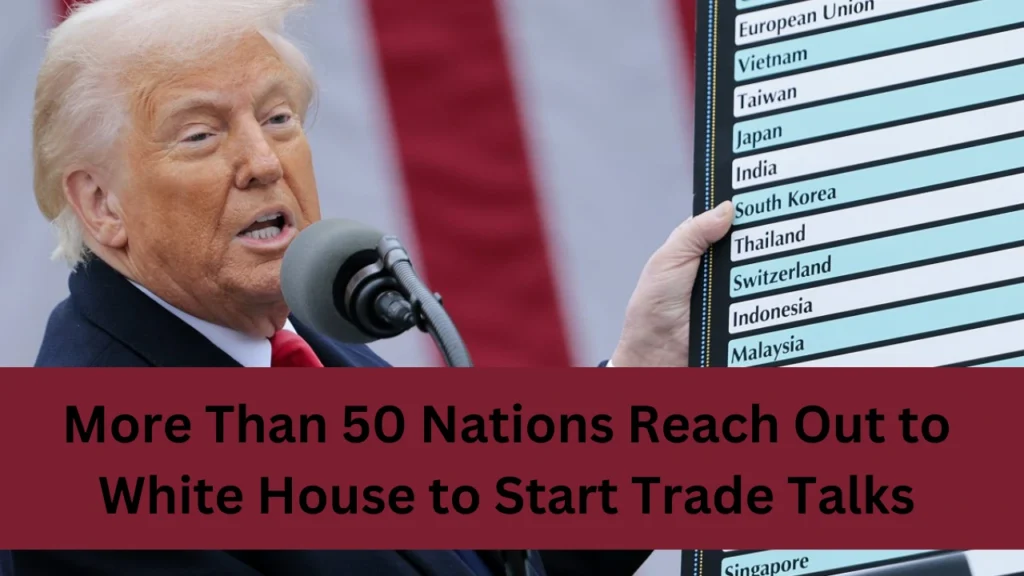U.S. President Donald Trump’s government has declared broad tariffs on imports in a daring attempt to reshape the global trade system. The policy affects not only strategic rivals like China but also long-time allies such as Israel, Italy, and Vietnam. The tariffs, which are set to take effect this week, have sparked widespread global reactions, prompting over 50 nations to contact the White House for urgent trade negotiations.

A Global Ripple Effect
The tariffs—some reaching up to 25–26% on steel, aluminium, and a broad range of other goods—have triggered widespread economic and diplomatic activity. From Asia to Europe, governments are now scrambling to understand the implications, prepare countermeasures, or begin negotiations.
Tariffs Begin, Uncertainty Spreads
The tariffs are slated to be collected starting Wednesday. Markets have already reacted sharply, with U.S. stocks suffering their worst week since the COVID-19 crisis began five years ago. The Dow Jones and other indices collectively dropped nearly 10%, raising fears of a potential global recession.
U.S. Officials Stand Firm
Despite the economic jitters, top Trump administration officials are standing by their decision. Treasury Secretary Scott Bessent stated that the move aims to correct “unfair trade practices,” noting that such systemic issues can’t be negotiated away in a matter of days or weeks. Commerce Secretary Howard Lutnick added, “The tariffs are coming. Of course they are,” affirming their necessity in resetting global trade—even though he only committed to them staying in place for “days and weeks.”
Trump, meanwhile, reiterated his resolve via social media:
“WE WILL WIN. HANG TOUGH, it won’t be easy.”
Reactions from U.S. Allies
Several U.S. allies are now caught in the crosshairs of the new trade regime. Israel faces a 17% tariff, and Prime Minister Benjamin Netanyahu is expected to raise the matter during an upcoming White House visit.
Vietnam, a major supplier of textiles, also reached out after President Trump revealed their leadership offered to cut tariffs to zero if a deal with the U.S. could be reached.
Italian Prime Minister Giorgia Meloni criticized the tariffs but affirmed readiness to defend affected industries through negotiations and policy tools.
European Commission President Ursula von der Leyen tweeted:
EU’s Strategic Countermoves
The European Union is preparing a united front. A $28 billion retaliatory package is being finalized, targeting U.S. products ranging from dental floss to semiconductors. Nearly 70% of EU exports to the U.S. may be affected, including pharmaceuticals, copper, and timber.
Responses vary:
- France backs bold countermeasures
- Ireland prefers a measured approach
- Italy questions whether retaliation is the right path
Congress and the Power Struggle
Trump’s unilateral action has reignited debate in Congress. A bipartisan bill has been introduced that would require any new tariffs to be approved by Congress within 60 days, or they would expire.
Rep. Don Bacon (Nebraska) plans to introduce a House version:
“We gave some of that power to the executive branch. I think, in hindsight, that was a mistake.”
Sen. John Barrasso added:
“There’s concern across the country. People are watching the markets.”
Business Leaders and Economic Minds Weigh In
Elon Musk, head of Tesla and Trump’s Department of Government Efficiency, advocated for a zero-tariff model between the U.S. and Europe. Trade adviser Peter Navarro responded sharply:
“Elon sells cars. He’s simply protecting his own interest as any business person would do.”
Former Treasury Secretary Lawrence Summers criticized the contradictory messaging from the administration:
“If tariffs are temporary, they don’t raise revenue or relocate businesses. If they’re permanent, they hurt free-market trade. The president can’t have it both ways.”
Media Blitz: Officials Defend Tariffs
Trump’s top economic officials defended the tariff policy across major political talk shows:
- Scott Bessent – NBC’s Meet the Press
- Kevin Hassett & Lawrence Summers – ABC’s This Week
- Howard Lutnick & Sen. John Barrasso – CBS’s Face the Nation
- Peter Navarro – Fox News’ Sunday Morning Futures
These appearances were part of a broader PR campaign to sway public and investor opinion.
A Turning Point in Trade History
This massive wave of tariffs covers nearly 70% of the EU’s total exports to the United States. Goods like copper, pharmaceuticals, semiconductors, and timber may be next in line. The European Commission is preparing a detailed list of U.S. products to face counter-tariffs, with France calling for bold action and Ireland urging a cautious response.
What Lies Ahead?
While the Trump administration downplays the risk of a recession, the pressure on global supply chains, inflation, and investment sentiment continues to grow. With over 50 countries initiating trade talks and global retaliation looming, the coming months will determine whether this bold economic gamble reshapes trade or backfires.

